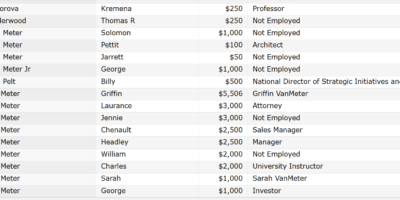By Ellen Deatrick
The Undressing Normal: (Un)conference on Sexuality for Those of Us DisLabeled took place February 10 at the Clarion Hotel in Lexington. Roughly 70 people attended—a diverse group sharing at least one purpose: they wanted to talk. Or should I say “we,” since I was one of the attendees, eager to engage.
In preparing to cover this event, I had someone ask me: “So is this going to be like an unarticle?” I thought about how an “unarticle” would look. One of the guiding principles of an unconference is: “whatever happens is the only thing that could have.” I like it. Yes, this will be an unarticle.
Six months ago, a steering committee met—that is, what became a committee. Then, it was simply a concerned group of Kentuckians. Latitude Artist Community led the synergy, sparked by the summer incident in Hazard County and looking to extend discussion on issues surrounding sexuality, disability, and gender identity. Back in June, two gay men with intellectual disabilities were forced from a Hazard community pool for what some deemed excessive displays of affection. While all parties involved appropriately resolved the situation, the events highlighted how few resources are available for educating disability caregivers on sexual matters, notably on LGBT support. Co-owner of Latitude Bruce Burris flatly stated: “Since we’re accepting the idea—finally—that sexuality is, most people would agree, a normal part of life, it is about time that we should start talking about this.”
The Human Development Institute (HDI) at the University of Kentucky jumped on board, feeling such a discussion aligned with their core mission. Kathy Sheppard-Jones, faculty member and training director with HDI, elaborated: “We really seek to enhance opportunities for people with disabilities across the lifespan, and the whole notion of sexuality is such an inherent part of who everyone is.”
The Nursing Home Ombudsman Agency of the Bluegrass also wanted in. As advocates for adults in long-term care, they were struck by the National Senior Citizen Law Center’s recent publication “LGBT Older Adults in Long-Term Care Facilities: Stories from the Field.” One story details a lesbian couple who, after moving to an assisted living facility, felt the need to hide their life-long identities out of fear. Feeling this fear unacceptable, state long-term care Ombudsman Kimberly Baker reported: “We’ve picked it up as one of our priority issues this year in the Ombudsman program.” ProgressLEX, a grassroots non-profit devoted to community betterment, brought unconference experience to the group. Having held successful unconferences a few years back, they lent their support advancing dialogue with this method.
So with a mishmash of motivations, the unconference took root, and became much more than probably anyone anticipated.
An unconference
Now, what’s with the “un” in front of conference? It’s not exactly the antithesis of a conference, as one might imagine. It is designed to bring people together, but perhaps with more opportunity for engaging conversation and continuing action than what might stem from a typical conference. Unconferences have been gaining momentum since skeptical critiques by national news source such as National Public Radio’s “Marketplace” (in 2008, they portrayed the format as groundless, unorganized, jargony, and ultimately ineffectual). Hailing from technology sectors in the Silicon Valley, the unconference has marched across the country and landed in Kentucky—now tackling a more basic, yet certainly as elusive topic as technology: sexuality.
The unconference design, while not altogether new to Lexington, is progressive in and of itself—fitting for issues outside mainstream dialogue. No experts, no agendas—the day is instead a product of all the attendees. It advances from an initial blog site to the actual event, where each participant is encouraged to suggest, and even lead, break-out sessions that interest them. The unconference then, theoretically, continues on the blog, Facebook pages, and e-mail groups long after.
Our unconference began on February 10 with everyone sitting face-to-face in a circle. For all but one of us, this was our first unconference. The circle consisted of straight, gay, lesbian, and transgender persons—some that considered themselves “dislabeled” and some that probably had never given much thought to their societal labels. Along with the group sponsors, representatives of social services agencies, rehabilitative specialists, parents and guardians, and concerned citizens rounded out the assembly.
Bev Harp, a graduate student of the HDI, opened with an invitation for us to get uncomfortable together. She stressed that we—perhaps insinuating more than just the immediate circle—needed discomfort. Ironically, as Sheppard-Jones reflected on that moment, she recalled: “Literally within the first fifteen minutes of that opening session, I felt the whole room sort of breathe a sigh of relief.”
Certainly, while our goal may have been to be uncomfortable (and I would say we often were), there was a notable communal trust from the beginning. People spoke up—it was a safe environment to do so.
Candor is key in an unarticle: never having attended an unconference, I’ll admit I doubted the format’s idealism. But it really was what Sheppard-Jones called an “equalizer,” and either because of this, or by some other surge of electricity, everyone exercised their voice. I was amazed by how much each individual contributed. Hence our shared purpose I alluded to earlier: we wanted to talk. I, the initial skeptic, must attribute the quality and prolificacy of the conversations to the open atmosphere of the unconference.
Everything from “Boundaries and parameters of guardians and families concerning issues of sexuality” to “How to get a boyfriend/girlfriend” materialized on the agenda wall, as individuals scribbled their concerns on paper and affixed them to the day’s schedule with tape.
Only one session was officially titled: “Recognizing a person as a sexual being,” yet many discussions spoke to this notion. Although seemingly counterintuitive, there was a need to discuss that people are people, regardless of disability, orientation, or any other marginalizing factor. Acknowledging sexuality as inherent to the human experience means recognizing that it is not reserved for the privileged, for those protected by society’s norms. So then if sexuality is not a privilege, is it a right? Not necessarily, as Sheppard-Jones affirmed: “It’s even more basic than [a right] because if you look at the hierarchy of needs—it’s physiological. If you look at Maslow’s Hierarchy—first rung. If your needs aren’t met there, how do you move on and aspire to anything beyond that?”
In bringing up these topics for discussion, the goal was never to take away the private and personal dynamic of one’s sexual life. Sherry Culp, with the Nursing Home Ombudsman Agency, said it well: “Our focus as advocates is that each resident receive individualized care. This [topic] is one of those things where you have to be focused on the individuals…or you could really cause harm to someone.”
Balancing privacy and advocacy
Throughout the unconference, a common focus on individualization & self-advocacy emphasized that these are indeed private matters. Yet the topics must be addressed, because so many live their private lives under the care of a guardian, social care agency, or long-term care facility. Individuals’ rights to a healthy and full human experience should not be sacrificed because of such a situation. Important questions arose, such as: How can a guardian effectively maintain their role, without acting as the conscience of the individual? How can one be their own health self-advocate if they don’t feel it’s ok to discuss sexual matters in a trusted setting?
To begin to answer the questions, many expressed that it is essential we normalize sexuality in society. Fear not—“normalizing sexuality” is not equivalent to fostering a sexually charged world with rampant open eroticism. It is recognizing that there are appropriate venues for discussing and exploring sexuality, regardless of gender, orientation, age, and physical or intellectual disability. In a country where court rulings determine much of guardianship and caregiver stipulations, we need educated judiciaries comfortable with really examining topics regarding human sexuality. In Kentucky, Medicaid waivers are currently being rewritten with a focus on improving community living. In the past, issues of an individual’s needs as a sexual being have been ignored. Perhaps this time there will be a push to tackle these issues in the revisions.
Many conveyed that the unconference was either the first or second time they had seen sexuality and disability discussed in such a large group. After some research, I can attest that there are comparable conversations going on—via the Internet. Not surprisingly so, since the Internet provides a relatively “safe” platform for communication, where ideas can bounce around quickly and unreservedly. But while constructive, this is no substitute for embodied conversations. Truly, we need face-to-face dialogue to move our communities, state agencies, and government towards progressive action. We need the spark of human interaction. And as the Undressing Normal unconference proved, a tangible event can also provide a nonjudgmental, positive atmosphere to have these discussions.
Before the day of the unconference, I sat down with Burris, and we got to talking about the “touchiness” of issues regarding sexuality and disability, and gender identity on top of that. He mused: “And it will remain that way until people start talking about them. Maybe they’ll always remain that way. Maybe people will just always talk about them. Well, just always talking about them is better than not talking, right?”
Moving forward
Now, I think Burris would agree: while I do foresee a lot more talking, action is imminent. In fact, continuing the charge was a key component of the day’s objectives. Careful notes were taken in each session, preserving at least two action steps the group felt to be appropriate follow-up for their conversations. Examples of action steps included better training surrounding LGBT issues for direct care providers, more thorough education for guardians regarding matters of sexuality, and—wait—more unconferences to be held. From what I hear, the day’s evaluations indicate that could be an extremely promising extension.
When I talked with Sheppard-Jones a week after the unconference, a meeting was already set for the planners to come back together and debrief. They intended to assess compiled notes from the event and propose ways to report back out. She stressed: “Some things are very important, and need to stay in the forefront. This is one of them. I think we’ve got people’s attention so we need to be good stewards and not lose it and move forward.”
I encourage you to follow-up on the unconference’s blog. See what’s happening. As we discussed that Friday, these topics are uncomfortable for us all—disability or no disability. In many cases, we grow up and maintain the practice of not talking about sex. But as incidents such as those in Hazard County and the National Senior Citizen Law Center’s study prove, we all must be raising the questions, and responding appropriately and respectfully to them. Very few of us currently have answers, no matter how long we have recognized ourselves as sexual beings. Genuine answers are possible, however, through awareness, education, and most basically—a willingness to ask.
Another main tenet of an unconference is “when it’s over, it’s over.” I’m not sure how I feel about this one, quite honestly. If this unarticle has done anything, I hope it has communicated that “it” is far from over.
The official blog site can be found at undressingnormal.wordpress.com. For more information on the unconference phenomena, visit http://www.unconference.net.




Leave a Reply